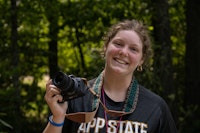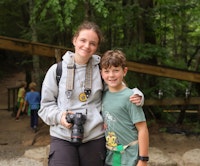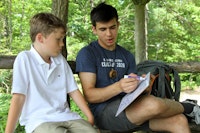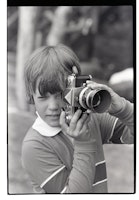
Camp Photographer
Start Your Application
Share the story of the summer
Camp photographers are responsible for taking photos of daily life at camp, sorting, editing, and uploading photos through the online portal available to parents. Images will also be used for marketing and promotional purposes.

Photographers will work together to cover all the activity areas around camp each day, and document any special events or camp-wide activities such as Morning Assembly, All-Camp-Games, Campfire, and Evening Programs. You’ll be spending a lot of time outdoors taking photos daily, balanced with time in camp’s media building uploading and editing photos.
You may bring your own digital camera/lenses, or use ones provided by camp. Prior experience with Adobe Lightroom is a plus, but not required.
What’s a Typical Day Like For This Position?
Camp photographers may have to walk up to several miles a day to get to all the different areas of camp activities. Typically we split camp up into “zones”, and photographers work together to rotate through those zones so they aren’t shooting the exact same location every day. Since there are 6 activity periods a day, photographers take turns shooting outdoors for two periods and editing for one period in the morning, and doing the same thing in the afternoon. There are also camp-wide programs that happen in the morning and evening that photographers capture, birthday photos, staff headshots, and cabin group photos. Further editing and uploading is done at the end of the day, when photographers work together to upload the photos taken by Adventure Staff on their trips out of camp. The photographers and videographer share space in a “media building” that has three computer stations where you can import and edit your photos (using the Adobe Suite), and later upload them to the hosting platform for parents to view and download.
Save Your Spot
While it’s a demanding role, it’s also a great way to practice your photography and editing skills, build your portfolio, and have the opportunity to get some of your work in print. We publish a magazine each year, which you can read online to see some examples of our best photos.
Typically, male staff live in a cabin with one other counselor and eight campers. In addition to their activity instruction or media role responsibilities, male counselors will have an assortment of responsibilities related to the management of their cabin. Female camp counselors also serve as activity staff, but don’t live in cabins with the campers, and are responsible instead for organizational tasks during the times that male staff are busy with their cabins.
Each day at camp begins with waking up and gathering on the benches at Morning Watch, a beautiful outdoor spot to start the day. Next we enjoy a hearty breakfast and an exciting Morning Assembly on the porch as a whole camp community. Then everyone splits off for their first three activities of the day, followed by a period of Free Choice before lunch.
On a typical day, each counselor will be assigned a specific area to supervise during one Free Choice period, and have the other Free Choice period to themselves as their “Self-Care Time”. Rest Hour happens after lunch, before the three activity periods in the afternoon. Then there is the second Free Choice period, dinner, and a fun Evening Program! A typical day ends with Milk and Cookies, followed by Evening Embers, a discussion time with your cabin mates to talk about the day’s adventures. Everyone is tired and happy by the time it’s Lights Out. On weekends, we take a break from our regular activity instruction, sleep in an extra hour, and play games as a whole camp community.
Need internship credit?
Many of our counselors who need internship credit to graduate don’t realize that they can earn that credit while working at camp! We can coordinate with your department to tailor a unique learning experience, and have set up internship credit across a wide variety of disciplines. Read more about the value of an internship at camp or how to translate your camp experience to your resume.
Working at camp isn’t just fun and rewarding, it’s also a great way to jumpstart your professional development. The skills critical for success in today’s world are developed and practiced at camp, including communication, collaboration, critical thinking, creativity, and contribution. You’ll make connections with people from a variety of cultural backgrounds, across the country and around the world. Being a Falling Creek alumni also connects you to a network of former staff and parents who are business owners, entrepreneurs, outdoor industry professionals, and employers. We are frequently asked to refer our most talented staff members.
Career Development & Resources
Why Should You Be a Camp Photographer?
As a photographer, you have the extremely important role of not only keeping parents updated and capturing the memories being made by their sons during the summer, but you also create the marketing content for the rest of the year too.
If you’re majoring in art or photography, being a summer camp photographer will give you helpful skills and portfolio material for your future career path. Even if your college major is unrelated to art, you’ll still be gaining leadership skills and networking connections that will give you a competitive edge in the job market, no matter where you’re headed next.
What’s My Time-Off Like?
Each week you’ll receive a scheduled time-off period of approximately 34 hours, typically in one block of time. While the 2025 time-off schedule specifics are up for discussion during this off-season, in 2024 a time-off period started at 1 pm on a certain day and ended at 11 pm the next day. For example, someone with a Monday time-off period would be off from 1 pm Monday to 11 pm Tuesday. Staff are also able to take an hour of “self-care time” each day at camp, where you are free to read, workout, nap, or do anything you need to “recharge your batteries” daily. Everyone gets the same amount of time off; the schedule is based on your position and role at camp. Being well-rested and refreshed is a must! (During session changeover weeks, this schedule is altered slightly.)
What Benefits Do I Get?
We offer a competitive and progressive pay schedule that is determined based on your experience, age, education, certifications, and other factors. See the 2026 Estimated Pay Sheet here. Staff working the full summer (Orientation plus 4 sessions) will have a base pay of $4300, not including additional pay, experience, and bonuses.
In addition to housing, food, and pay, each day at camp brings adventure, physical recreation, and endless opportunities for personal and professional growth. You are welcome to use the camp facilities and participate in activities during your free time, so long as it does not take away from a class or camper.
Visit our “What You Get” page to read more about the value of an internship at camp, how to translate your camp experience to your resume, resources, networking, and certifications offered.
When Do I Need To Be Available?
While individual dates may differ based on your personal contract, our summer season is from mid May to mid August, and our preference is to hire for the full season. For the 2025 season,
All-Staff Orientation begins on May 30th (Friday, arrive by 10 am). Closing Day is August 15th after the final session.
Depending on your role at camp, you may need to arrive earlier in May for additional training. We begin WFR certification training (for Adventure Staff only) on May 17th, followed by Leadership Training (for Line Leadership, Activity Leaders, Adventure Staff, Lifeguards, and Horseback Staff only) on May 26th. You also have the option to extend your contract by joining us for Father/Son Weekends.
What Essential Skills Are Needed?
Staff must be at least 18 years old, and/or completed at least one year of college or similar life experience.
Our mission is existing to shepherd the journey of personal growth through love and adventure. Staff must be dedicated to live by the Falling Creek Code.
Patient. Flexible. Team Player. Genuinely Enthusiastic. Friendly. Eager to Grow. Open to Offer and Receive Feedback. Able to Think on Your Feet. Good Decision Maker. Hard Working. Get-It-Done Attitude.
See more on our staff FAQs page.